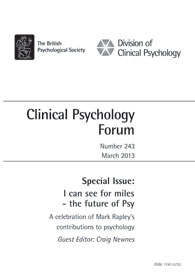Just Saying It As It Is: Names matter; Language Matters; Truth Matters
 Clinical language has colonised experiences of mental distress and alienation. Consequently, many accounts of healing and recovery seem to be about a decolonising process, a reclaiming of experience (Dillon and May, 2002). These counter narratives, which offer diverse representations of survival in adversity (hooks, 1993), follow in a long tradition of protest literature (Hornstein, 2002). From slavery abolitionists and suffragettes, to feminists and black and gay civil rights activists, who have repudiated dominant, oppressive ideologies via the language of discrimination, to challenge injustice. Many of us within mental health activism have argued that it is crucial to decolonise the medicalised language of human experience in order to contest the dominant paradigm of the biomedical model of madness and distress. After all, fighting for the rights of those labelled mentally ill, is the last great civil rights movement (Dillon et al, 2013).
Clinical language has colonised experiences of mental distress and alienation. Consequently, many accounts of healing and recovery seem to be about a decolonising process, a reclaiming of experience (Dillon and May, 2002). These counter narratives, which offer diverse representations of survival in adversity (hooks, 1993), follow in a long tradition of protest literature (Hornstein, 2002). From slavery abolitionists and suffragettes, to feminists and black and gay civil rights activists, who have repudiated dominant, oppressive ideologies via the language of discrimination, to challenge injustice. Many of us within mental health activism have argued that it is crucial to decolonise the medicalised language of human experience in order to contest the dominant paradigm of the biomedical model of madness and distress. After all, fighting for the rights of those labelled mentally ill, is the last great civil rights movement (Dillon et al, 2013).


Leave a Reply
Want to join the discussion?Feel free to contribute!